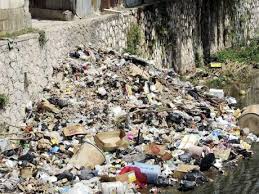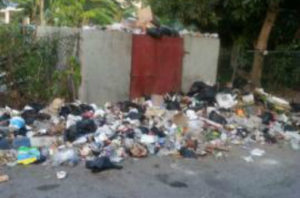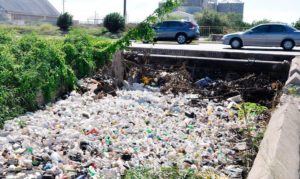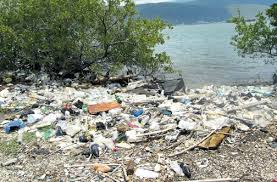I listened in horror as the caller to the popular day-time radio talk show described his passenger’s attitude towards litter. “He finished eating his KFC in my taxi and then just threw the bag, cup and box with bones out the window of the moving vehicle. I told him that he shouldn’t have done that, that he could have just left it in the car, that I would have disposed of it when next I stopped. He got vexed with me. Asked me wha mi think garbage truck and garbage man di deh fah…” The same taxi man told the talk show host that he ferries visitors to the island around Montego Bay and he is repeatedly asked about the amount of visible garbage in the second city. The visitors are appalled, quizzical and disdainful all at the same time. “Is there some sort of problem?” they ask in wonderment.
 |
| Garbage in gully. Photo courtesy the Gleaner |
We have a garbage problem. My family and I have perfected the art of the road-trip and we can, at a moment’s notice, head north, south, east or west in Jamaica, and we do. Often. We do not have to go three feet off the beaten track to be confronted with garbage: plastic bags, bottles and containers. Have you seen Downtown Kingston after a shower of rain? Remember the flooding due to clogged drains in Montego Bay a few weeks ago after thirty minutes of rain? Just look down into every single gully in Kingston that you drive past and over: garbage and more garbage. No TVJ nightly newscast is complete without the obligatory “raw sewage overflowing” story, the overflow the result of drains clogged with solid waste.
 |
| Garbage outside a school. Photo courtesy the Jamaica Observer |
How Come?
The Broken Windows Theory
In 1982, Wilson and Kelling posited the Broken Window theory in an attempt to link serious crime to seemingly less innocuous incidents of disorder like vandalism and littering. Even though their theory has its fair share of criticism as far as diagnosing and treating serious crime, at its simplest level, the theory in part explains why dirty communities remain this way. They observed: “…consider a pavement. Some litter accumulates. Soon, more litter accumulates. Eventually, people even start leaving bags of refuse from take-out restaurants…” Simply put, allowing the first hint of disorder to go unchecked is a welcome mat for more of the same. Garbage attracts garbage. And after a while it’s as if we don’t see it. The garbage around us has simply become part of the landscape, the proverbial dead body in the living room, which was appalling at first sight, but as the inhabitants started to manoeuvre around it and as they got used to the sight of it, the dead body became just another fixture in the room.
 |
| Plastic bottles in gully heading out to sea. Photo from thebitterbean.wordpress.com |
Studies Show…
The Jamaica Environmental Trust (JET) has bravely attempted to tackle Jamaica’s garbage problem with their “Nuh Dutty Up Jamaica” campaign. Some young talented animator did the eye catching visuals to the zippy tune that admonishes us accordingly. Nice. But meaningless in the face of the enormous problem we face. You see, the garbage that we co-exist with, is not simply the result of that passenger in the taxi flinging his waste through the car window. JET recently released the results of a study done to look at the garbage issues and the South Gully in Montego Bay. While the scope of the study was limited to the South Gully, the findings and recommendations have wider application for the island.
Garbage is habitually dumped in our gullies. No one readily admits to dumping, but the evidence is clear. In the face of erratic, unpredictable and in some cases non-existent garbage collection, what do you think will really happen? Informal settlements generate waste too. To include them on a garbage collection schedule may legitimise them, giving rise to a whole new set of problems. Many public skips where people could deposit their garbage in a central place for pickup have been removed. People used to burn their garbage there, destroying the skips, and infrequent collection saw the skips morphing into mini dumpsites, a haven for rodents and other pests.
We already know how to fix it
The South Gully Research Project made recommendations, recommendations that have been proffered time and again. Here they are, modified for general application:
1. Establishment of a regular cleaning schedule for gullies which is published in newspapers and online.
2. Increased frequency of garbage collection
3. Establishment of a well-publicized garbage collection schedule and map of collection routes
4. Roll out of a significant quantity of bins along established garbage collection routes. Skips might be appropriate in some places (at the entrance to informal settlements for example) but it should be recognized that they take much longer to clear. Lightweight, plastic bins, with holes punched in the sides and bottom to discourage theft, are most effective in urban areas where frequent garbage collection takes place. Private sector support should be sought to finance the bins.
5. Enforcement of anti-dumping laws should be dramatically ramped up island wide. This enforcement should be accompanied by appropriate publicity, including messaging targeted at business operators promoting good solid waste management practices.
6. Revision of the NSWMA act to include specific regulations for solid waste management by commercial and industrial operations; increase fines and impose harsher penalties for non-compliance. Revisions should be accompanied by increased enforcement effort.
But will that do it?
I’ve itemized the recommendations above with a heavy heart.
There is a perspective that leadership in Jamaica has lost the art of implementation and has become preoccupied with speeches and box-ticking. It further posits that those in positions of influence and power have managed to insulate themselves from certain Jamaican realities and therefore expend nothing on fixing those ills besetting others; think private schools, private education, private security, gated communities, vehicles that shuttle them from A to B, high off the ground in air-conditioned insularity. They vacation in exclusive locations, out of the line of sight of road side dump sites, and in all-inclusive, created experiences, totally separate from the speak-easy that exists beside a pile of garbage uncollected in two weeks. Out of sight, most definitely out of mind.
And so priorities are set based on a particular skewed perspective and outlook by the powerful and wealthy. And those who see and know and feel The Other Side of Things, in their quest for the Great House quickly adopt the priorities of those who are where they want to be, eschewing the urgent and real needs of our present context.
Tackle the issue at the Community Level
So is grass roots activism and action the answer to get things moving? Perhaps this is one of the first steps towards making our present system of governance redundant and shifting the current paradigm towards one that is more proactive and relevant to us.
Imagine this happening at the Community level:
1. Education campaigns about improper garbage disposal. Get a local company to sponsor a poster competition in the community schools. Tell them to include actual pictures of what is wrong in their community.
2. Again get a local company to sponsor the printing of dozens of the winning poster and then commission local groups like the 4H Club, Scouts, church youth group to strategically, and with permission place these posters in central areas.
3. Set a small goal of creating a garbage free zone in a public area enjoyed by locals and visitors alike. Make noise about it. Use social media to spread the news of this success story. Replicate this in another area.
4. Get the Councillor and MP on board: THEY have to pressure NSWMA to cart the garbage away regularly and reliably. KEEP UP THE PRESSURE! Use social media to shame and congratulate. Because make no mistake, there are those who make every effort to bag and discard their garbage properly, but their best efforts are thwarted by the non-collection of their garbage! There’s no reliable schedule of collection and public skips seem to be a thing of the past.
The Case for an Executive Mandate
I fear though that the general recommendations extrapolated from JET’s South Gully Research Project and my own offerings about a revolution at the local level are an insufficient response to the enormity of the garbage problem we face. We have already established that solutions exist. It is not as if we do not know what to do. So what next then?
All the literature on change management in organisations underscore the importance of sponsorship from the executive level when major change is required. The more radical and far reaching the change, the more critical it is for all stakeholders to know that it is supported by The Leader. This makes it safe for them to step out of their comfort zone. This offers some sort of guarantee that the needed resources will be allocated appropriately in support of the desired change.
In the 1960’s, Lee Kwan Yew, then president of Singapore, determined to distinguish Singapore from other Third world countries, decided that he would make it clean and green. He easily saw the link between a clean country, a desirable business and tourism destination and the morale of the citizens. Admittedly, the attitudes of the people proved the hardest to tackle. He prioritized law enforcement with respect to littering and greening of the city. New standards for farming and operating within the city were enacted. In his own words, Lee Kwan Yew stated that “perseverance and stamina were needed to fight old habits.” But he did it. Today, Singapore and its people reap the rewards of vision and stellar leadership in this regard.
Improperly disposed of garbage leads to breeding sites for mosquitoes and rats. Clogged drainage causes millions of dollars in damage resulting from flooding whenever it rains. The government of Jamaica is currently spending millions of dollars treating and monitoring pregnant women testing positive for ZikV and treating patients diagnosed with Guillaine-Barre Syndrome associated with ZikV infections. Lost productivity due to ChickV outbreak last year was likely in the millions of dollars. As the country gets dirtier and dirtier, visitors will opt for cleaner, safer more beautiful destinations. How will we counter the inevitable bad press that will result from filthy, unkempt, unsafe and unsanitary tourist destinations? Spend more money on PR, I suppose and huge sums on mass gully scrapings to take shame out of our eyes.
The bottom line: we cannot afford NOT to allocate resources to implement the recommendations suggested. This will only happen with a clear mandate from the Prime Minister and his tangible, visible support. Take on this challenge of making Jamaica clean, Mr. Holness. Make a clean Jamaica your lasting legacy.
Dear PM: I know that your overarching mandate is economic growth…a worthy ideal to be sure. Law and order cannot flourish in garbage. And without law and order, what happens to any and all economic growth initiatives? I put it to you that your direct leadership in tackling our garbage problem is absolutely critical at this point in our development… perhaps more critical than anything you are spearheading right now. Getting to a cleaner Jamaica is low hanging fruit that we can ill afford not to pick.
 |
| Garbage washed ashore along the Palisadoes strip. Photo courtesy the Gleaner. |





Solutions are necessary and the Broken Windows concept may be one.
Since most adults have allowed the garbage problem to grow, how about educating a cadre of young people to drive an anti-littering revolution?
The adults in the room can provide the impetus.